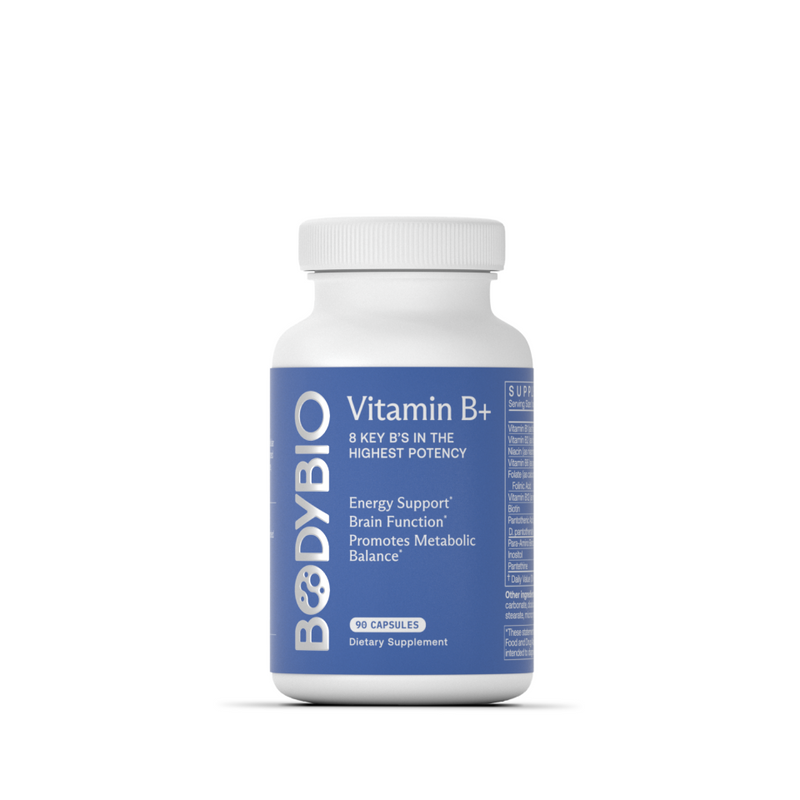Best Time to Take Vitamin B12 for Maximum Benefits
Authors:

Ashley Palmer
Nutritional Therapy Practitioner, Health & Wellness Expert
Key Takeaways:
- Vitamin B12 plays a vital role in energy metabolism, neurological health, and red blood cell formation.
- For optimal absorption, B12 is best taken in the morning—especially on an empty stomach.
- Avoid taking B12 too late in the day as it may interfere with sleep.
- Combining B12 with a full B-complex supplement like BodyBio Vitamin B+ may improve absorption and support synergistic benefits across multiple B vitamins.
- Pairing B12 with proper gut support (enzymes, probiotics, or butyrate) can further enhance absorption.
Table of Contents:
Why Timing Matters for Vitamin B12 Absorption
Vitamin B12 (cobalamin) is a water-soluble vitamin critical for DNA synthesis, red blood cell production, and neurological function. Unlike fat-soluble vitamins, B12 is absorbed in the small intestine through a complex process that depends on intrinsic factor—a protein made in the stomach.
Absorption can be affected by many factors:
- Time of day
- Food intake
- Gut health
- Supplement form (e.g., methylcobalamin vs. cyanocobalamin)
To get the most from your B12 supplement, timing is key. Absorption rates are highest when B12 is taken when stomach acid levels are optimal—typically in the morning.
Should You Take Vitamin B12 in the Morning or at Night?
Morning is the best time to take vitamin B12, ideally on an empty stomach. Here's why:
- B12 helps convert food into cellular energy (via methylation and ATP production), so taking it earlier supports your body's natural circadian rhythm.
- Taking it late in the day may increase alertness or interfere with sleep.
- Many people feel a noticeable energy lift within hours of taking it—making morning the perfect time to harness that boost.
If you take BodyBio Vitamin B+, which includes methylated B12 (methylcobalamin) along with other methylated Bs like folate (5-MTHF), you'll get a clean lift in mental clarity, energy, and mitochondrial support without the crash or overstimulation.
How Vitamin B12 Affects Energy and Sleep
Vitamin B12 is known as the "energy vitamin" for a reason—it supports:
- ATP production in the mitochondria
- Nerve signaling and mood regulation
- Cognitive clarity and focus
Because of its activating effects, B12 is not recommended close to bedtime. It won't necessarily act like caffeine, but if you're sensitive to supplements or have trouble winding down, it may disrupt your sleep cycle.
Many people with low B12 experience:
- Brain fog
- Fatigue
- Low motivation
- Poor memory
Supplementing with a methylated B complex can help correct these symptoms while also supporting detoxification, neurotransmitter balance, and healthy methylation—a process that affects everything from gene expression to hormone metabolism.
Can You Take Vitamin B12 with Other Supplements?
Yes—and in fact, you probably should.
Vitamin B12 works best when taken alongside:
- Other B vitamins: For example, B6 and folate work with B12 to regulate homocysteine and methylation.
- Magnesium: Supports enzymatic reactions and neurological function.
- Digestive enzymes and probiotics: These support the breakdown and absorption of nutrients, especially in those with gut issues or low stomach acid.
- Butyrate: This short-chain fatty acid strengthens the gut lining and supports nutrient absorption.
- TUDCA: A bile acid that helps maintain liver and gallbladder function, which indirectly supports absorption of fat-soluble and water-soluble nutrients alike.
Taking BodyBio Vitamin B+, which offers a full spectrum of methylated B vitamins in their most bioavailable forms, ensures you get complementary support from all angles—methylation, detox, energy, and focus.
Best Way to Take Vitamin B12 for Maximum Absorption
Here are the top strategies to ensure your body actually uses the B12 you're taking:
1. Take it in the morning on an empty stomach
This maximizes absorption, especially in sublingual or capsule forms. Avoid coffee or acidic foods within 30 minutes if possible.
2. Choose the right form
Look for methylcobalamin, the active, bioavailable form of B12. It's what your body actually uses—unlike cyanocobalamin, which must be converted and may be less effective, especially for those with MTHFR mutations.
3. Combine with a B-complex
B vitamins work synergistically. A full-spectrum formula like BodyBio Vitamin B+ ensures your cells have everything they need to create energy, regulate stress, and support detox pathways.
4. Support gut health
Low stomach acid or poor digestion can impair B12 absorption. Pairing B12 with digestive enzymes, probiotics, or butyrate can improve gut integrity and absorption.
Final Thoughts on When to Take Vitamin B12
To truly feel the energy-enhancing, brain-boosting, and metabolism-supporting benefits of vitamin B12, morning is the optimal time to take it. It's best absorbed on an empty stomach and should ideally be part of a high-quality B-complex supplement, like BodyBio Vitamin B+, to unlock its full potential.
If you're struggling with fatigue, brain fog, or poor digestion, B12 may be a missing link. And if you're already taking B12 but not noticing much benefit, it may be time to:
- Switch to a methylated form
- Improve your gut environment with enzymes, probiotics, or butyrate
- Pair it with other synergistic B vitamins for full-body support
Remember, supplements don't work in isolation. Your body thrives when nutrients are delivered as part of a complex system—just like nature intended.
O'Leary, F., & Samman, S. (2010). Vitamin B12 in health and disease. Nutrients, 2(3), 299–316.
Allen, L. H. (2009). How common is vitamin B-12 deficiency? The American Journal of Clinical Nutrition, 89(2), 693S–696S.
Stover, P. J. (2004). Physiology of folate and vitamin B12 in health and disease. Nutrition Reviews, 62(6), S3–S12.
Green, R., & Kinsella, L. J. (1995). Current concepts in the diagnosis of cobalamin deficiency. Neurology, 45(8), 1435–1440.
Ames, B. N. (2006). Low micronutrient intake may accelerate the degenerative diseases of aging through allocation of scarce micronutrients by triage. PNAS, 103(47), 17589–17594.

